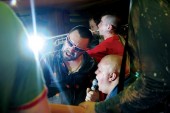Myspace Layouts - Myspace Editor - Image Hosting
Leningrad was devised and founded by Sergey Shnurov (nicknamed “Shnur”) in St. Petersburg in 1997. Their first performance took place in the club “Art-Clinika” on January 13, 1997. Their first album Pulya (Bullet) was recorded two years later with the help of famous Petersburg musician Leonid Fedorov from the group Auktsion. But this album didn’t make the revolution. Leningrad continued as an underground project, increasing its popularity through performances.
From the very beginning, Leningrad refused to cater to any one genre, and always featured one consistent attribute – its nonnormative vocabulary (and free use of swear words). With great reserve, one could say that the first album has a kind of chanson style, but it’s clear that that isn’t true. In the arrangements and sound one can hear the influence of Leonid Fedorov.
As a result of a creative discrepancy, the lead singer Igor Vdovin left the group that year and Shnurov took his place. As Shnurov later claimed in an interview “Igor Vdovin sang, but what he needed to do was growl.” The childhood friends separated, and Shnur began to “growl” his songs by himself.
It was rare for the band to perform with less than 10 musicians. The permanent fixtures included: the tuba, the saxophone, the trombone, bass, guitar, drums and bass drum. Sometimes they were joined by a keyboard, an accordion, contrabass, balalaika, xylophone or even a musical saw. The composition of the band changed frequently, but the skeleton remained constant. The last important change occurred in 2002, when all members of the ska punk band Spitfire joined Leningrad after collaborating on Leningrad’s fifth album Pirates of the 21st Century.
Going back to 1999, after Bullet, Leningrad released one of its best albums, Mat Without Electricity. This album was made all in one breath, recorded live over the course of a few days. The album is permeated with the atmosphere of kitchen poetry and superior alcohol aesthetics a la Charles Bukowsky.
2000 was marked by the band’s emergence from the underground. The album Dachniki (Dacha People) made a big boom. The music of the band became faster and harder. More importantly, Leningrad became the music of the people with the band figuring as cultural heroes.
In 2001 Shnur recorded Made in the Ass under the band name Tri Debila (Three Retards) – a club version of Leningrad’s music: using only Shnurov, an accordion, a tuba and drums. This child was stillborn – it had only a couple performances, but the album still stands as a remarkable piece in Shnurov’s collection.
In 2002, riding on a wave of popularity, Leningrad recorded Pirates of the 21st Century with Spitfire. Here you can find more rage, ska, and irony. At the same time the album contains the hit song “Mne by v nebo” (I wish I was in the sky), where Shnur momentarily removes his cynical punk mask.
Leningrad’s compositions were included in a vast number of music compilations of all genres: everything from rock to disco to pop and reggae. Leningrad’s videos were among the most popular in the hit parade. The leading musical publications and television channels regularly recognized the group. The group also gained recognition abroad, performing with success in America, Germany, Israel, and the Baltics in 2001 – 2002. In 2003 Shnurov founded his own label ShnurOK (pronounced Shnur ROCK), on which Leningrad, Spitfire and Ska Jazz Review (the side project of the members of Spitfire) recorded, as well as Petersburg’s most alternative groups.
At the end of 2003, Gala Records released Leningrad’s sixth album Tochka (Point) without Shnur’s permission. It represented a compilation of un-edited works. But the market was ready to accept anything with Shnurov’s name on it. According to Russia’s largest radio producer Michael Kozyrev, “Shnurov’s cough is enough for the audience.”
In this light, it seems pointless that Moscow Mayor Yurii Luzhkov would ban the band from performing in the nation’s capital in 2003. Mister Luzhkov didn’t seem to understand what a great promotion he was doing for the band. It only served to add to the thousands of fans who would travel in great swarms to Petersburg for concerts in the well-known sports stadium Jubilee.
In the period from 2003 to 2005, Leningrad released three studio albums, gaining enormous popularity with the album For Millions (2003), the experimental play BabaRobot (2004) and Huinya (Crap), recorded together with the British cult group The Tiger Lillies.
In 2005, Leningrad devoted a great deal of time to the studio, making exceptions only for major events. In the summer, the group headlined Russia’s most significant rock festival “Nashestvie” (Invasion) and once again pleased fans in Munich and Cologne, New York and Boston. In the fall, Shnurov and his team played their first concerts in Austria (Graz) and Switzerland (Zurich).
A year’s worth of seclusion yielded the most significant event of the year – the release of the long-awaited album Khleb (Bread), which was rapturously met by the public and the press. Hard psychobilly and socially critical texts evidenced the group’s new creative direction.
In the fall of 2006, after several European tours, Leningrad released Babie Leto (Indian Summer), in which Shnur returns to the real source of his creativity: bablo (bling), bukhlo (booze) and babi (babes). The upbeat and carefree feel of the album corresponds with the video releases: P and X (each of these letters standing for the slang word for male and female genitalia) and Guboshlyol (The Mumbler). Avrora, the group’s latest album, was released at the end of 2007 and is enjoying great success.
Цена:
130 руб
КУПИТЬ
Ленинград. Маде Ин Жопа
Цена:
346 руб
КУПИТЬ
Ленинград. Пуля
